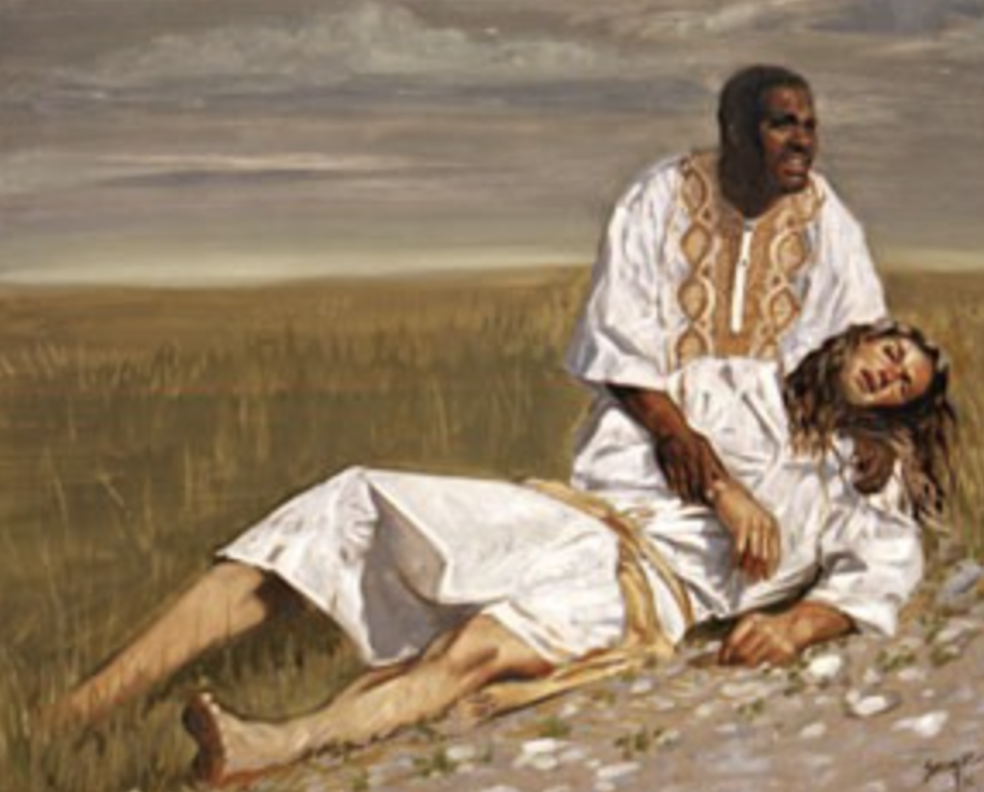Isn’t life complicated sometimes? There’s that time when our paths diverge or bump into each other. It’s finding that opportunity to walk alongside many people, without leaving them on their own especially if they are suffering. For that we need some understanding of what is required: some guidance, a rule. In the past as a teacher, I would often consider the difference between a ruler and a rule…Often pupils would make the mistake: with our Gospel reading today we also might jump to conclusions. Have we jumped to a conclusion when reading the title: the Good Muslim?
This week’s reading is from Luke 10:25-37, the well known Good Samaritan story.
The 70 or 72 have just gone out on their travels. They have come back and tell of their exploits. They were exuberant, Jesus rejoiced. A lawyer speaks. Was he one of the 72?
What must I do to inherit eternal life? The lawyer regales the Torah: “You shall love the Lord with heart, soul, strength, mind; and your neighbour.” Yes but who exactly is my neighbour?

Jesus tells him a story. It’s a fable, for characters are injected into the story dependent on where you live. Here’s one from the Pandemic. We have a man who is beaten up by a robber…. boo, that’s horrible.
A priest and passes by: shock, horror – how could they? (did they offer thoughts and prayers resembling some members of the church in the US after Uvalda?)
The Levite, a member of the Temple, does so likewise. Shock horror, this couldn’t happen – people cry.
But a Samaritan (boooo) came and helped, got off his own animal, paid for his care, and promises to pay more. (Absolute silence from the crowd) That silence isn’t because they feel guilty but no Samaritan would help the Jew in those days. This was unthinkable. Hence why Jesus tells this story.
What’s your response when hearing ‘Samaritan’?
When we hear the word Samaritan what are our initial thoughts? It’s generally always linked to ‘Good Samaritan’. We have some hospitals which include such a title. But politically this story has been told in many ways:
- President Bush said that the wounded traveller was on the road to Jericho, many listeners thought he was referring to the place in New York also called Jericho. Is it about us or wider than that?
- The Queen spoke of tolerance and respecting others, looking after fellow humans.
- The citizens of Sierra Leone interpreted the story as that you could accept aid from anyone who might offer it, including the Soviet Union.
- Maggie Thatcher claimed that no one would recall the Good Samaritan if they had only good intentions – he also had money.
- In the state of Nevada, there is an article of law – the Good Samaritan Act – which has some exclusions.
- Would anyone offer a response with a Good Muslim? I have known many a good Muslim.
The Samaritan is the one, it is perceived, who was the opposite of the Jew – for the Jew is the one who cares for others. Both Jew and Samaritan claimed that they were the true descendent from Abraham, they had the true understanding of the Torah. The Samaritans claim that they came from Joseph, that the Jews went off track when Eli set up a sanctuary at Shiloh, and that they added texts to the Torah.
You may recall that in John Chapter 4 Jesus meets with a Samaritan woman who offers hospitality. It’s said that we should read this in context, with the parallel reading of Nicodemus in John Chapter 3. It contrasts the Jew and Samaritan, indicating that the Samaritan has the right idea. But it is odd that, in Luke’s Gospel, Luke 9, Jesus has said to the disciples that they shouldn’t visit the towns in Samaria, and they should set their face towards Jerusalem.
Has the Church ever suggested that we shouldn’t speak with Muslims? I have known this. Can you see the modern link here?
It isn’t about Muslims or Samaritans but how we interpret, view, others.
Is it about life after we die?
Jesus is asked the question ‘How do I inherit eternal life?‘. Eternal life wasn’t about going to heaven or exiting downwards to hell in those days. Hell wasn’t even contemplated as we might do today. [Hell for me might be situations which we can’t face: the onset of cancer, the impending death, not a physical space] This question is about life now.
What is the purpose of life? (Spoiler alert: the answer is not 42)
“What is written in the law? What do you read there?” says Jesus.
What do you read here?
Is Jesus suggesting that the Scriptures are not set in stone but are open to being interpreted? They are living texts. When the lawyer asks who’s my neighbour? Jesus responds by flipping the question. Who do I need to love? Which of these characters in this story should we love?

You might wish to explore which love (in Greek) is used here. It’s not brotherly love, nor sexual love but God’s all encompassing love, agape.
Do we love our family, then friends, then those whom we agree with, then … If we tend to overlook and even avoid those who are different then we may to ponder a while…and then this story is for us.
Who are those churchy people?
The Priest and the Levite could represent Judaism. They appear interested only in their self; but were these people called, ordained? to a particular duty. Were they intentionally nasty folk, or just committed to their calling? It’s a parable remember, a story thrown down alongside, like a plumb line, to measure our faithfulness. It doesn’t give the whole answer, it’s asking us to give the answer today.
So we might compare the compassion from those the Jews despised, the Samaritan, with the negativity, apathy, seeking to alienate, from the 2 Godly men.
Does the story end there?
So what might happen if the Samaritan found more people down that road – why not? the robbers may not stop at one person. Would the Samaritan not help the rest? Would they call upon their friends and help them. Perhaps start a movement to stop the robbers moving so freely along that road? Warn others of the danger?
They could so easily have said well they aren’t Samaritans so why bother? It’s not my community, my world…
This story isn’t about going to heaven. It’s about life itself, here on Earth where Jesus said here is the Kingdom of Heaven. It is about breaking free from the restrictions placed upon ourselves by society, liberation to loving others.
- Leviticus 19:18, 33-34 “… you shall love your neighbour as yourself. I am the LORD… When an alien resides with you in your land, you shall not oppress the alien. The alien who resides with you shall be to you as the citizen among you; you shall love the alien as yourself, for you were aliens in the land of Egypt: I am the Lord your God.”
Retelling the story in our world
Here’s another telling of the Good Muslim storyline: https://michaelpahl.com/2016/03/18/the-parable-of-the-good-muslim/

Here is a more modern telling of that story.
An Israeli Jew was on their way to Jericho, and was attacked by thieves, left half dead in a ditch. Two people passed them by: the first was a Jewish medic from the Israeli Defence Forces, the second an overseas missionary. But the person who did show compassion was a Palestinian Muslim whose sympathies lies with Hamas. Hamas is a political party whose charter not only anticipates the destruction of Israel but depicts Jews as responsible for some of the world’s problems . This parable of the Good Muslim, even a Good Hamas Muslim might be a difficult one to resonate with to western ears, but so would a Good Samaritan to Jewish ears. If Jesus were a Samaritan there would have been a parable about the Good Jew, told in the streets of Ramallah. Might we all see a better vision for choosing how to live.
from Amy-Jill Levine’s brilliant book Short Stories by Jesus, pp. 114-115
This is more than loving all, this really emphasises loving your neighbour, and that necessary change in ourselves – to answer that question: How do I inherit eternal life? When might we take this to heart?
It was very interesting
News to me this year was this: If the victim was unresponsive, he could be dead … to find out would require touching him; touching a dead man would render the priest & levite ritually unclean. If that is so, maybe the parable is additionally a call to review how rigid adherence to religious law can kill our humanity?
Is that akin to the Nevada Good Samaritan law; don’t taint yourself with helping someone unresponsive? They haven’t also given you permission to intervene.